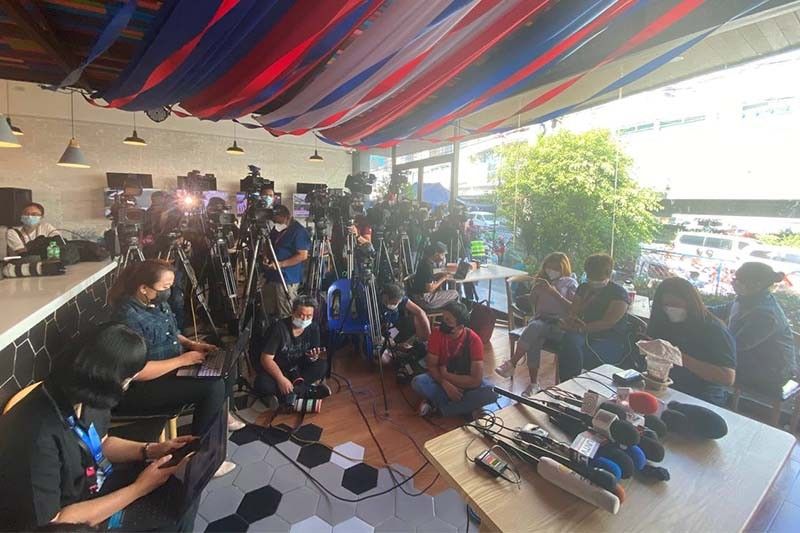Journalists grapple with audience distrust, hostility driven by disinformation

MANILA, Philippines — Lamenting that audiences have not only lost trust but have become adversarial towards journalism, journalists at this year’s Jaime V. Ongpin Journalism Seminar struggled to find solutions and answers to this existential problem faced by the profession which they partially blamed on disinformation.
According to a Social Weather Stations survey released in October, 86% of respondents recognized that "fake news" — a term for misinformation and disinformation — is a problem. Many — 58% — identified social media influencers, bloggers and vloggers as peddlers of fake news about government and politics but 40% also said this came from journalists.
“What is existential when it comes to my reporting and our newsroom is this new dynamic with the audience, how participative it is. And not just participative but how the audience has become adversarial to the press as well,” said Rappler reporter Rambo Talabong, one of the seven panelists selected by veteran journalists for the talk.
“How do we act in the face of an audience that distrusts us, even hates us? People who would comment and go as far as attack us in our message inboxes threatening our lives and even killing one of our fellow journalists, Percy Lapid, for speaking out the truth and being critical.”
ABS-CBN anchor Karmina Constantino attributed the adversarial attitude of some people toward journalism to the “breakdown of empathy” of journalists toward their audiences.
“We have failed to be empathetic to the public that we serve. And I think that’s the reason why it’s become sort of an us against them when it should be one and the same,” said Constantino, who was selected by the Canadian Embassy as this year’s Marshall McLuhan fellow.
ABS-CBN reporter and anchor Mike Navallo said people’s loss of trust in traditional media is “one of the biggest challenges” faced by journalism, which he attributed to disinformation and the rise of other information sources like vloggers.
“It’s now a question of how do we compete with all of those sources of information, to stay afloat, remain credible and help try to shape the conversation, particularly in the challenge to address disinformation,” Navallo said.
Meanwhile, Inquirer.net content researcher and writer Cristina Eloisa Baclig said individual journalists and newsrooms still face pressure to tone down reporting that may be perceived as critical to the government.
“This is alarming especially for younger journalists because it discourages them to do more or to explore more on what they can write,” Baclig said.
On top of these, Bulatlat managing editor Len Olea said there has been a “deliberate and systematic campaign to discredit and demonize the media,” which journalists and the public they serve must push back against.
“We need to think of ways to engage the public effectively because they have a big role to play in defending the profession. We have come to the point that we need to defend journalism and its vital role in a democracy,” said Olea, whose newsroom was given the Award of Distinction by the Center for Media Freedom and Responsibility.
RELATED: Filipino journalists find selves at crossroads after Marcos Jr. victory
Down from ivory towers
The problem, as independent journalist Christian Esguerra pointed out, is that journalists are only talking among themselves in a bubble and are not getting their message out to a wider audience.
“It’s hard to engage now with the public,” Esguerra said in Filipino. “For example, now, we all agree with what each of us has been saying, and for all we know, we’re speaking in our own big information bubble. We’re not crossing over.”
For journalists to cross over, Talabong said, they must come down from their ivory towers and consume what their audiences are consuming so they can get a feel of what kind of content they like to read or watch.
“It’s not fighting fire with fire or lies with lies, but fighting their language in our language but with our standards,” he said. “We can’t just keep on doing what we’re used to doing. We have to go to places we’re not used to. We have to embrace what is cringey, what is not in the ivory tower, what can sound as cheap to many reporters.”
News5 senior correspondent and anchor Maeanne Los Baños, meanwhile, said there is a need to show what sets journalists apart from vloggers and other content creators.
“In this day and age, now more than ever, we need to let them see that we, the legitimate journalists, are accountable and responsible for the reports that we produce. That is what makes us different from the vloggers and other content creators,” Los Baños said.
Financial independence, organizing
Given these perils and problems, one student attending the seminar asked whether journalism is even worth pursuing to which the panelists resoundingly answered in the affirmative.
Constantino even said that aspiring journalists should try to be financially independent so they can also be independent in their reporting.
“Be financially independent so you can throw out the questions, follow a story without being beholden to anyone even if you’re a salaried employee of a news organization,” she said, suggesting that budding journalists take a side hustle not related to the profession.
But for Olea, being capable of staying in journalism should not just be about having a sideline.
“It’s not just about having a sideline to be able to pursue journalism. Well, that is our situation right now. But we really want to work toward making journalism a viable profession by organizing ourselves into unions, perhaps, or pushing really for our economic conditions,” said Olea, who is also the secretary general of the National Union of Journalists of the Philippines.
Constantino, as this year’s Marshall McLuhan fellow, will go on a two-week study tour of Canadian media and academic organizations and a lecture tour of Philippine universities.
Meanwhile, Bulatlat received a P50,000 check for being selected for the Award of Distinction.
Each panelist at the Jaime V. Ongpin Journalism Seminar received P20,000 as a token for their participation.
- Latest
- Trending





























